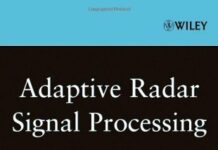
Ebook Info
- Published: 2003
- Number of pages: 512 pages
- Format: PDF
- File Size: 4.26 MB
- Authors: Simon Haykin
Description
Edited by the original inventor of the technology.Includes contributions by the foremost experts in the field.The only book to cover these topics together.
User’s Reviews
Editorial Reviews: Review “…strongly recommended for researchers working in the field of signal processing and its applications.” (IEEE Circuits & Devices, January/February 2006) From the Inside Flap A landmark text in LMS filter technology–– from the field’s leading authorities In the field of electrical engineering and signal processing, few algorithms have proven as adaptable as the least-mean-square (LMS) algorithm. Devised by Bernard Widrow and M. Hoff, this simple yet effective algorithm now represents the cornerstone for the design of adaptive transversal (tapped-delay-line) filters.Today, working efficiently with LMS adaptive filters not only involves understanding their fundamentals, it also means staying current with their many applications in practical systems. However, no single resource has presented an up-to-the-minute examination of these and all other essential aspects of LMS filters–until now.Edited by Simon Haykin and Bernard Widrow, the original inventor of the technology, Least-Mean-Square Adaptive Filters offers the most definitive look at the LMS filter available anywhere. Here, readers will get a commanding perspective on the desirable properties that have made LMS filters the turnkey technology for adaptive signal processing. Just as importantly, Least-Mean-Square Adaptive Filters brings together the contributions of renowned experts whose insights reflect the state-of-the-art of the field today. In each chapter, the book presents the latest thinking on a wide range of vital, fast-emerging topics, including:Traveling-wave analysis of long LMS filtersEnergy conservation and the learning ability of LMS adaptive filtersRobustness of LMS filtersDimension analysis for LMS filtersAffine projection filtersProportionate adaptationDynamic adaptationError whitening Wiener filtersAs the editors point out, there is no direct mathematical theory for the stability and steady-state performance of the LMS filter. But it is possible to chart its behavior in a stationary and nonstationary environment. Least-Mean-Square Adaptive Filters puts these defining characteristics into sharp focus, and–more than any other source–brings you up to speed on everything that the LMS filter has to offer. From the Back Cover A landmark text in LMS filter technology–– from the field’s leading authorities In the field of electrical engineering and signal processing, few algorithms have proven as adaptable as the least-mean-square (LMS) algorithm. Devised by Bernard Widrow and M. Hoff, this simple yet effective algorithm now represents the cornerstone for the design of adaptive transversal (tapped-delay-line) filters.Today, working efficiently with LMS adaptive filters not only involves understanding their fundamentals, it also means staying current with their many applications in practical systems. However, no single resource has presented an up-to-the-minute examination of these and all other essential aspects of LMS filters–until now.Edited by Simon Haykin and Bernard Widrow, the original inventor of the technology, Least-Mean-Square Adaptive Filters offers the most definitive look at the LMS filter available anywhere. Here, readers will get a commanding perspective on the desirable properties that have made LMS filters the turnkey technology for adaptive signal processing. Just as importantly, Least-Mean-Square Adaptive Filters brings together the contributions of renowned experts whose insights reflect the state-of-the-art of the field today. In each chapter, the book presents the latest thinking on a wide range of vital, fast-emerging topics, including:Traveling-wave analysis of long LMS filtersEnergy conservation and the learning ability of LMS adaptive filtersRobustness of LMS filtersDimension analysis for LMS filtersAffine projection filtersProportionate adaptationDynamic adaptationError whitening Wiener filtersAs the editors point out, there is no direct mathematical theory for the stability and steady-state performance of the LMS filter. But it is possible to chart its behavior in a stationary and nonstationary environment. Least-Mean-Square Adaptive Filters puts these defining characteristics into sharp focus, and–more than any other source–brings you up to speed on everything that the LMS filter has to offer. About the Author SIMON HAYKIN, PhD, is University Professor and Director of the Adaptive Systems Laboratory at McMaster University. BERNARD WIDROW, PhD, is Professor for Adaptive Systems at Stanford University. Read more
Keywords
Free Download Least-Mean-Square Adaptive Filters 1st Edition in PDF format
Least-Mean-Square Adaptive Filters 1st Edition PDF Free Download
Download Least-Mean-Square Adaptive Filters 1st Edition 2003 PDF Free
Least-Mean-Square Adaptive Filters 1st Edition 2003 PDF Free Download
Download Least-Mean-Square Adaptive Filters 1st Edition PDF
Free Download Ebook Least-Mean-Square Adaptive Filters 1st Edition





